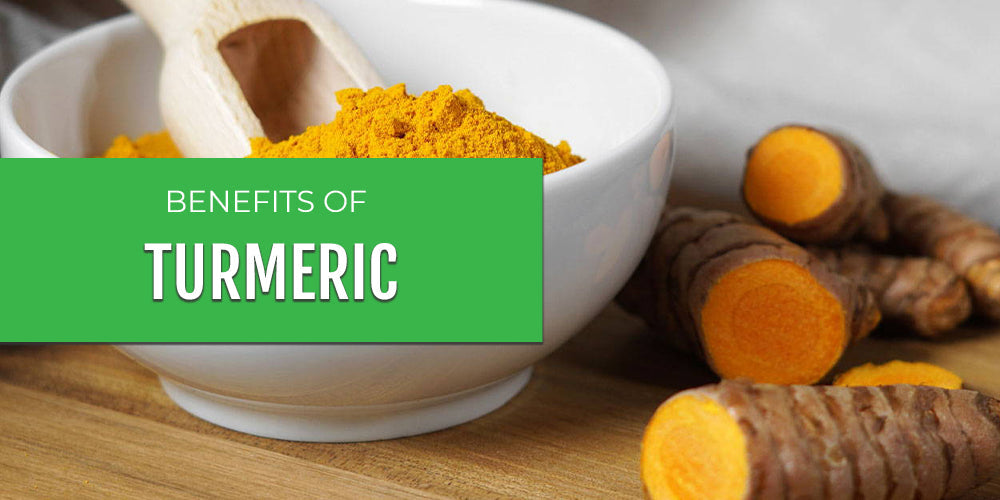Benefits of Turmeric Root
Turmeric is one of the most abundant & widely used spices in the world, and it could also be one of the healthiest!
Just take a look at these benefits of consuming turmeric and you’ll see what we mean.
1. It's an Anti-Inflammatory
The main beneficial compound in turmeric is curcumin, which has a potent anti-inflammatory effect. This compound can attack inflammation at the root, which in turn could help to reduce the risk of countless chronic diseases.
Turmeric doesn’t do much for short-term inflammation, which occurs following injuries, but it can combat long-term, chronic inflammation, which typically occurs as a result of diet or disease and can greatly reduce a person’s lifespan. These anti-inflammatory effects could help to alleviate conditions like IBS and may also play a role in lessening the symptoms of arthritis.
2. It Increases Antioxidant Activity
Not only can turmeric reduce chronic inflammation, but it can also increase antioxidant capacity, significantly decreasing the risk of early death from diseases like cancer and coronary heart disease. Antioxidants help to eradicate free radicals, which are thought to cause a number of diseases, and a diet rich in these compounds could greatly improve wellbeing and life expectancy.
Turmeric contains a number of these compounds but research has shown that it also helps to boost the body’s capacity for them, providing a double-whammy that significantly boosts overall health and wellbeing.
3. It Could Reduce the Risk of Heart Disease
Not only can turmeric increase antioxidant capacity, which in turn could reduce the risk of heart disease, but it could also have a more direct impact on heart health, helping to combat thrombosis and to balance cholesterol levels.
This is especially true for people who consume large amounts of turmeric in their diet, as this spice is often used in Indian cooking, which is rich in herbs, spices and vegetables, all of which can also improve heart health.
4. It May Reduce Neurological Decline
Turmeric is known to increase the levels of an important hormone, a lack of which has been linked to neurological decline and to conditions like Alzheimer’s and Parkinson’s. This is why turmeric consumption has been linked to memory improvements and why it is often used for psychological and neurological issues. A lot more research needs to be conducted before any concrete conclusions can be made, but it’s a very promising field of research and bodes well for anyone who consumes turmeric on a regular basis.
What Turmeric Can’t Do
Turmeric has become synonymous with “healthy”, and health food companies, bloggers, and vloggers have used this to their advantage. There are all kinds of weird and wonderful claims being made about turmeric, including that it can be used to whiten teeth.
It’s important to practice a little common sense here. Sure, turmeric can greatly reduce inflammation and improve antioxidant capacity and those benefits can lead to many more. However, if you’ve ever chopped turmeric root or used turmeric paste you’ll know how quickly and deeply it can stain your fingers—that should tell you all you need to know about turmeric and teeth whitening.
There is no research to suggest that turmeric will do anything but stain your teeth even more, and there is also very little research to suggest that it can cure migraines, toothache, or stomach ulcers, despite claims to the contrary. We have even encountered blogs stating that turmeric can cure tuberculosis, which seems to stem from research conducted on TB patients who used turmeric in combination with other herbs and found they could reduce some of the side effects of TB drugs.
Turmeric is a potent substance that’s well worth your time and can do some amazing things, but it’s not a panacea, it’s not the answer to all ailments, and you should take non-evidence backed claims with a pinch of salt.
Turmeric and Cancer
A lot has been said about turmeric and its ability to cure and prevent cancer. This is a relatively new field and not a great deal is known, but there have been a number of exciting developments and what we have learned is very promising.
Turmeric certainly can help to reduce the risk of developing many forms of cancer, especially if it is consumed as part of a healthy, balanced diet. But it can not prevent cancer with absolute certainty. As for being a cancer cure, there has been some research suggesting that large doses of turmeric, in combination with piperine (from black pepper) can play a role in reducing tumor size.
However, turmeric is not a definitive cure and there is nothing to suggest that adding it to your diet will cure the disease. It shouldn’t do any harm though and it may help, so it’s worth trying.
The Best Turmeric
Turmeric is everywhere these days. It’s added to tablets, teas, tinctures, and health food formulas—you can’t visit a health food store without being bombarded with turmeric supplements.
The problem is, many of these supplements use low-quality extracts. In creating our Detox Organics superfood formula we wanted to buck that trend while still using this spice, so we found the highest quality, 100% certified organic turmeric and added it alongside many synergistic herbs and spices.
The end result is a daily detox drink that packs a potent punch and can support your immune system, digestive system and overall wellbeing. You can get all the benefits of turmeric alongside benefits provided by superfoods like broccoli and alfalfa, herbs like lemon balm and moringa, and so much more.
7 day jumpstart
fill out the info
below to get your weight loss started!

